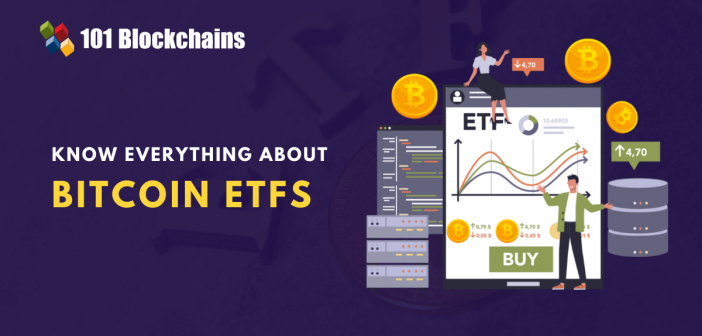The growth of famous cryptocurrencies in recent years has been one of the foremost highlights for millions of crypto enthusiasts. After the 2017 ICO boom, the value of Bitcoin has been improving by huge margins, with possible values crossing three times the value of its previous market high. Exceptional growth in value of Bitcoin has increased the possibility of attention towards Bitcoin ETFs and their various implications. Bitcoin holds the reputation of being the first popular cryptocurrency and has become one of the top choices of governments, retail investors, and companies all over the world.
On the other hand, Bitcoin comes with various technical complications, such as security of private keys. Therefore, investors look for effective and secure alternatives to safeguard their Bitcoin. Exchange-Traded Funds or ETFs offer a favorable solution for making the most of Bitcoins without having to own or store Bitcoins. Will Bitcoin exchange-traded funds open up new possibilities for Bitcoin adoption? The following discussion offers you a detailed introduction to Bitcoin ETF and their working alongside their advantages and drawbacks.
Want to become a Cryptocurrency expert? Enroll Now in Cryptocurrency Fundamentals Course
What is ETF?
Before you dive into the Bitcoin ETF definition, it is important to understand the meaning of an ETF or exchange-traded fund. Exchange-traded funds are not a new concept in the world of finance and have been used in financial markets for over two decades. As a matter of fact, ETFs have been successful in collecting almost $1 trillion as managed assets, with hundreds of ETFs being launched every year.
What does the exchange-traded fund actually mean? It is basically a fund or security you can use for tracking the price of associated assets. You can have traditional assets such as oil and gold alongside other commodities in the scope of ETFs. The ETF helps you establish custody over the assets which are under tracking alongside issuing shares for confirming ownership over the associated assets.
The behavior of ETFs is almost the same as that of traditional stocks in the facility of trading on regular stock exchanges. Exceptional growth in popularity of ETFs has been attributed to the perceived selling and buying potential alongside solid liquidity. Investors can explore better accessibility to underlying assets in ETFs rather than accessing the assets directly. Majority of entries in Bitcoin ETFs list can help you enjoy such convenience in trading with Bitcoin. As a matter of fact, the support for Bitcoin ETF set the foundations for introducing crypto ETFs in the first place.
What is Bitcoin ETF?
The overview of Bitcoin ETFs is practically incomplete without its definition. Interestingly, you don’t have much to discover with a Bitcoin ETF in comparison to a general ETF. The Bitcoin ETF is basically a tradable instrument for tracking the value of Bitcoin. Interestingly, the Bitcoin ETF is generally listed on traditional exchanges, much like the equity stocks.
The process for creating a crypto ETF or Bitcoin ETF would focus on the management company acquiring the actual coins from the market. The actual crypto serves as the reserves like the case of traditional ETFs. Now, the company has to create a fund representing the value of Bitcoin in its ownership, followed by listing it on the stock exchange for trading.
Investment in Bitcoin exchange-traded funds is a suitable choice for average investors. It does not involve any security or logistics risks pertaining to management of cryptocurrencies. Generally, the complete process of purchasing Bitcoins or other cryptocurrencies through an exchange is considerably confusing. In such cases, investors also face issues regarding storage of their cryptocurrencies. At the same time, it is also important to consider the possibilities of risks for the average investor without any technical expertise. How do crypto ETFs solve this problem?
Want to become a bitcoin expert? Enroll Now in Getting Started with Bitcoin Technology Course
Working of Bitcoin ETF
The simple definition of Bitcoin ETF shows the possibility of exercising custody over Bitcoin without any troubles with storage or custody. However, many people jump to questions like “Which Bitcoin ETF is best?” immediately. On the other hand, it is important to take a step back and dive deeper into the working of ETFs. You must have a clear impression of the different methods for creating ETFs and their management before investing your money. Here is an overview of the working of Bitcoin ETF in a few simple steps.
-
Creation of the ETF
The process of creating a Bitcoin ETF starts with a reliable custodian such as a crypto exchange or an asset management company. The custodian begins the process by collecting funds from investors, followed by purchasing shares associated with the underlying crypto asset. Parties involved in purchasing the underlying crypto assets for exploring different benefits of the ETF are referred to as authorized participants. In the case of Bitcoin ETFs, the custodian would buy positions of Bitcoin and the futures contracts by using investor funds.
-
Distributing Assets
The second step in the working of crypto ETFs refers to distribution of assets to ETF providers. The authorized participants work on distribution of the assets in return for shares in the fund of ETF providers. Value of the shares is directly proportional to the value of assets received by ETF providers. As a result, the investors would easily become shareholders in the fund without claiming actual ownership of the underlying asset.
-
Regulatory Approval
The next step in the creation of a crypto ETF refers to a prominent setback in need of regulatory approval. ETFs must have approval of a regulatory body responsible for the securities market. For example, regulators in the US and Europe have shunned every attempt at approval for ETFs.
Regulatory agencies have stated that the limitations regarding price manipulation alongside security of underlying crypto assets have been hindering the approval of ETFs. The history of crypto exchange-traded funds failing to gain approval goes back to 2013. The Winklevoss brothers lost in an attempt to obtain approval for their Bitcoin Trust.
-
Listing on Exchanges
The final stage in the working of Bitcoin exchange-traded funds refers to listing on exchanges. After an ETF gets on the exchange, it can be purchased or sold. In addition, the decisions with respect to purchasing or selling ETFs can bring losses or profits for investors.
At the same time, it is also important to know about the management fees associated with ETFs. Depreciation in the net asset value or NAV of the ETF can help in covering the management fees. Why? ETFs are more or less the same as traded stocks and could fluctuate in pricing over the course of the trading day.
Get familiar with the terms related to cryptocurrency with Cryptocurrency Flashcards
Types of Bitcoin ETF
The category of Bitcoin ETF is an important highlight in the discussions on crypto exchange-traded funds. You can find two distinct categories in the Bitcoin ETFs list, such as Bitcoin futures ETF and Bitcoin spot ETFs. The futures ETF refers to a fund representing the value of cryptocurrency you can purchase or sell according to the contract conditions.
On the other hand, you would not have any ownership over the underlying crypto asset at the time of buying or selling futures. All you have is a contract that guarantees to buy or sell cryptocurrency at any point time in future. Therefore, future ETFs can easily deal with price swings and market instability. However, they don’t offer the facility for staking or using coins in voting like you would have if you were the direct owner of the cryptocurrency.
The discussion on “Which Bitcoin ETF is best?” would draw the focus on Bitcoin spot ETFs. Spot ETFs are basically one-time digital asset purchases where buyers and sellers exercise direct ownership of cryptocurrency. The working of spot ETFs is the same as that of transactions on all modern crypto exchanges. A major share of criticism has been drawn towards the design of Bitcoin futures ETF as it takes Bitcoin futures into account.
As a result, it can have more risks of underperformance in comparison to Bitcoin spot ETFs. Furthermore, Bitcoin’s future ETFs can also imply the burden of higher prices in comparison to that of the underlying asset. In addition, the difference between Bitcoin ETFs suggests that it has the backing of derivatives. On the contrary, spot ETFs don’t have any such risks.
Want to know the answers to some of the commonly asked questions about cryptocurrency? Check the detailed guide on Frequently Asked Questions About Cryptocurrency
Benefits of Bitcoin ETF
The promises of increasing Bitcoin adoption could become clearly evident with the Bitcoin ETF definition and its working. However, it is also important to know how institutions and retail investors could use ETFs as an opportunity to access Bitcoin as an asset. Many people favoring ETFs suggest that the Bitcoin ETF delivers an investment model with credible value advantages. Here is an outline of the various advantages associated with Bitcoin ETF.
- Bitcoin ETFs serve as a favorite instrument for growing awareness regarding blockchain technology. They can help in offering exposure and validation for cryptocurrencies and Bitcoin from financial markets worldwide.
- ETFs have been traded like stocks on exchanges, thereby offering chances for growing popularity among retail and institutional investors. Bitcoin ETF has evolved as a popular security type with stable liquidity.
- Average crypto investors can bypass the complicacies of exchange and trade in cryptocurrencies easily without centralized intervention.
- ETFs can also introduce flexible options for short-term, long-term, or medium-term investments.
- The support of better definition in regulations for Bitcoin exchange-traded funds can open up the roads for tax advantages, limited volatile trading, and restrictions on market manipulations.
- Bitcoin ETF can ensure benefits for institutional investors with pension funds and mutual funds alongside supporting portfolio expansion.
Drawbacks in Bitcoin ETFs
The limitations on entries in a Bitcoin ETF list would draw the discussion towards a more practical angle. How can you assume that ETFs are a reliable choice for investing in crypto without reviewing their setbacks? The notable challenges associated with Bitcoin ETF include the following,
- The management fees associated with ETFs are a formidable setback for investors as a significant amount of shares can amount to a massive volume of management fees.
- Bitcoin ETFs do not offer the actual ownership of the crypto asset as it helps in tracking an asset’s price. At the same time, limitations on crypto trading with ETFs are clearly evident as it does not qualify as an investment fund.
Want to learn blockchain technology in detail? Enroll Now in Certified Enterprise Blockchain Professional (CEBP) Course
Final Words
The dominance of ETFs has been growing gradually as they are becoming more common in the world of cryptocurrency. One of the notable examples of a Bitcoin ETF refers to the ProShares Bitcoin Strategy ETF. Furthermore, the US Securities and Exchange Commission has imposed many blockades for different proposals on ETFs.
It is important to look for successful examples of ETFs for cryptocurrencies to define the future of crypto ETFs. The simple Bitcoin ETF definition and the working of ETFs shed light on the possible future prospects for cryptocurrency adoption. How far would ETFs play a crucial role in transforming the crypto space? Start learning more about the different implications pertaining to crypto ETFs and their significance now.
Join our annual/monthly membership program and get unlimited access to 25+ professional courses and 55+ on-demand webinars.
*Disclaimer: The article should not be taken as, and is not intended to provide any investment advice. Claims made in this article do not constitute investment advice and should not be taken as such. 101 Blockchains shall not be responsible for any loss sustained by any person who relies on this article. Do your own research!




